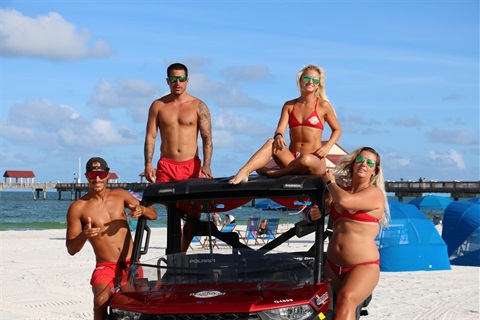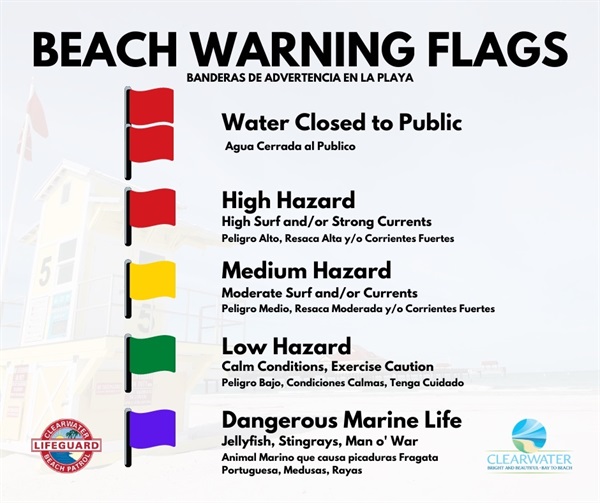Clearwater Beach Rules & Information

No Alcohol
No alcohol or other intoxicants are permitted on Clearwater's public beaches.
No Smoking
No Dogs, Cats or Other Animals
No animals are allowed on public bathing beaches. This means no pets, dogs or cats in the public bathing area of Clearwater Beach, with exception of service animals. The U.S. Department of Justice defines service animals as dogs that are individually trained to do work or perform tasks for people with disabilities. To view a map of where pets are allowed on Clearwater Beach, visit the "Pets on Clearwater Beach" page.
No fires
No fires, bonfires, or unpermitted fireworks are allowed on Clearwater Beach.
Surfing, Paddleboarding, Windsurfing, Skimboarding
Surfboards, sailboats, motorboats, personal watercraft or singular hard-surfaced objects are not permitted to be beached on the public bathing beach area of Clearwater Beach. If you'd like to participate in any of these activities, they must be done outside the swim zone or on North Beach past Somerset Street.
Metal Detectors
Metal detectors are allowed by permit-only.
Do not remove sand from the beach
Trees, wood, plants, sand, soil, rocks or flowers cannot be removed from the park or beach.
No Fishing or Cast Netting
No person shall at any time fish from public beaches in any designated swim area.
No Camping
No person shall set up tents, shacks or any other temporary shelters, or any special vehicle to be used for such purpose, such as a house trailer, camp trailer, camp wagon or the like on Clearwater Beach or any other public beach in the city, including park property or the Courtney Campbell Recreation Area.
View All Beach & Park Rules
Beach Safety
Always Swim Near A Guarded Lifeguard Tower
Heed the advice, instructions and warnings of lifeguards. Don't overestimate your swimming abilities, and never swim alone. Swim within the "Safe Bathing Limit" at all times. This area extends 300 feet west of the high water line and is clearly marked by buoys or pilings.
When Thunder Roars, Go Indoors
Weather can change quickly, causing conditions to deteriorate fast. Stay out of the water and stay off the beach when lighting is present.
Don't Fight the Rip Current
Break the grip of the rip. Don't fight the current. Escape the current by swimming in a direction following the shoreline. When free of the current, swim at an angle - away from the current - toward the shore. Wave for a lifeguard. Most importantly - don't panic.
Do the Stingray Shuffle
Stingrays are generally not aggressive fish, but they will defend themselves if they feel that they are threatened, such as being stepped on. To avoid stings, shuffle or slide your feet slowly through the sand to warn the stingrays of your presence, and they will move out of your way. Do the "stingray shuffle" from the time you get in the water until the time you get out. If you get stung, see a lifeguard or go to a nearby fire station for an assessment of your injury.
Beach Warning Flags

Flags posted on the beach and flying from lifeguard towers represent ocean hazards and surf conditions. Please remember that water conditions can change quickly. Check with the lifeguard on duty if you are unsure of safe conditions.
View the most recently reported status of the beach flags
Swim Sober
Alcohol is a major factor in drowning. Alcohol impairs swimming ability and good judgment. Alcohol is NOT allowed on Clearwater Beach.
Don't Float Where You Can't Swim
Often, non-swimmers dangerously use flotation devices to go offshore. If they fall off, they can quickly drown. The only exception is a person wearing a Coast Guard-approved life jacket.
No Diving
Don't dive headfirst. Protect your neck. Diving headfirst into unknown water and striking the bottom can lead to serious, lifelong injuries, including paraplegia. Check for depth and obstructions before diving, and then go in feet first the first time. Use caution while body surfing, always extending a hand ahead of you.
Boating & Jet Skis Safety
Beach Wheelchairs are Available
The city provides manual and motorized beach wheelchairs for our visitors with special needs and who wish to access the beach. Find out more about beach wheelchairs.
Stay Hydrated and Wear Sunscreen
Florida sunshine is intense. Be careful when sunbathing and use sunscreen with a high SPF.
No Unauthorized Vehicles on Beach Walk
Motorized and electric bicycles, hoverboards, unicycles and scooters are no longer allowed on Beach Walk at Clearwater Beach, except for medically necessary devices. These types of vehicles are still permitted in areas designated for vehicular traffic, such as streets, parking lots, street rights-of-way, driveways and drive aisles.